Foreign relations of Kosovo are accomplished by efforts of the Ministry of Foreign Affairs of Kosovo. Kosovo operates 33 embassies abroad and is host to 22 embassies in Pristina. Kosovo has membership in several international organisations.
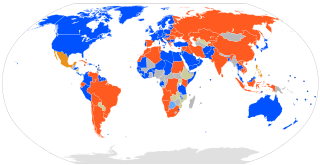
International recognition of Kosovo, since its declaration of independence from Serbia enacted on 17 February 2008, has been mixed, and international governments are divided on the issue.

Czech Republic–Kosovo relations are foreign relations between the Czech Republic and the Republic of Kosovo. Kosovo declared its independence from Serbia on 17 February 2008 and Czech Republic recognized it on 21 May 2008. The Czech Republic opened an embassy in Pristina on 16 July 2008.
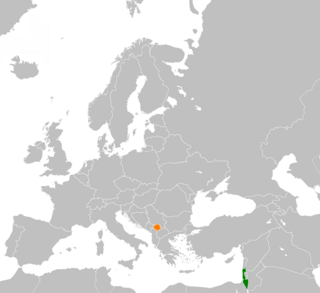
Israel–Kosovo relations refer to bilateral relations between Israel and Kosovo. Kosovo declared its independence from Serbia on 17 February 2008. Israel and Kosovo agreed on 4 September 2020, as part of negotiations for the Kosovo and Serbia Economic Normalization agreements, to mutually recognize each other. It was initially reported that the mutual recognition had not yet gone into effect at that point, and Israel's recognition of Kosovo was expected to be formally declared "in the coming weeks". However on 21 September the ambassador of Israel to Serbia, Yahel Vilan, confirmed that Israel had indeed recognized Kosovo on September 4, 2020. The two countries established diplomatic relations on February 1, 2021. On March 14, 2021 Kosovo officially opened its Embassy in Jerusalem.

Egyptian–Kosovan relations are foreign relations between Egypt and Kosovo.
Kosovo's declaration of independence from Serbia was enacted on Sunday, 17 February 2008 by a unanimous vote of the Assembly of Kosovo. All 11 representatives of the Serb minority boycotted the proceedings. International reaction was mixed, and the global community continues to be divided on the issue of the international recognition of Kosovo. Greece's reaction to the 2008 Kosovo declaration of independence in general is neutral.
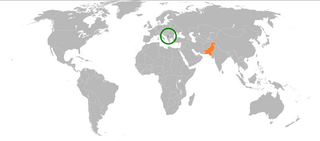
Kosovo–Pakistan relations refer to the bilateral ties between the Republic of Kosovo and the Islamic Republic of Pakistan. Kosovo is a partially recognized state that is claimed by Serbia in its entirety as the Serbian province of Kosovo and Metohija. On 24 December 2012, Pakistan recognized Kosovo as an independent state, becoming the 98th state to do so. Simultaneously, Pakistan's ambassador to Turkey in Ankara was accredited to Kosovo.

Bangladeshi–Kosovan relations are foreign relations between Bangladesh and Kosovo. Bangladesh recognised the Republic of Kosovo as independent state on 27 February 2017. A year later on the same date, Kosovan consul in New York Teuta Sahatqija and Bangladesh's Permanent Representative to the United Nations Masud Bin Momen signed a treaty to officially establish diplomatic relations.

Kosovo–Thailand relations are foreign relations between the Republic of Kosovo and the Kingdom of Thailand. Thailand recognised the Republic of Kosovo as independent state on 24 September 2013.
Kosovar–Zambian relations are foreign relations between Kosovo and Zambia.

Cameroonian–Kosovar relations are foreign relations between Cameroon and Kosovo. Formal diplomatic relations between two states are non-existent as Cameroon does not recognize Kosovo as a sovereign state.

Congolese–Kosovar relations are foreign relations between the Democratic Republic of the Congo and Kosovo. Formal diplomatic relations between two states are non-existent as the Democratic Republic of the Congo does not recognize Kosovo as a sovereign state.

Guatemalan–Kosovar relations are foreign relations between Guatemala and Kosovo. Formal diplomatic relations between two states are non-existent as Guatemala does not recognize Kosovo as a sovereign state.

Iraqi–Kosovar relations are foreign relations between Iraq and Kosovo. Formal diplomatic relations between two states are non-existent as Iraq does not recognize Kosovo as a sovereign state.

Kosovar–Ugandan relations are foreign relations between Kosovo and Uganda. Formal diplomatic relations between two states are non-existent as Uganda does not recognize Kosovo as a sovereign state.
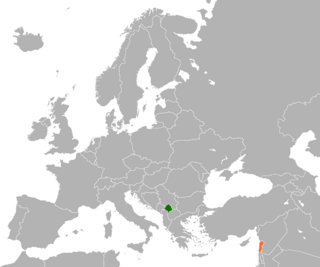
Kosovar–Lebanese relations are foreign relations between Kosovo and Lebanon. Formal diplomatic relations between two states are non-existent as Lebanon does not recognize Kosovo as a sovereign state.

Kosovar–Moroccan relations are foreign relations between Kosovo and Morocco. Formal diplomatic relations between two states are non-existent as Morocco does not recognize Kosovo as a sovereign state.
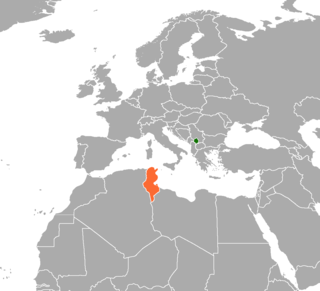
Kosovar–Tunisian relations are foreign relations between Kosovo and Tunisia. There are no formal diplomatic relations between the two states as Tunisia has not recognized Kosovo as a sovereign state.

Ecuador–Kosovo relations are foreign relations between Ecuador and Kosovo. Formal diplomatic relations between two states are non-existent as Ecuador does not recognize Kosovo as a sovereign state.

Kosovo's declaration of independence from Serbia was enacted on Sunday, 17 February 2008 by a unanimous vote of the Assembly of Kosovo. All 11 representatives of the Serb minority boycotted the proceedings. International reaction was mixed, and the world community continues to be divided on the issue of the international recognition of Kosovo. Nigeria’s position has been somewhat mixed.



















